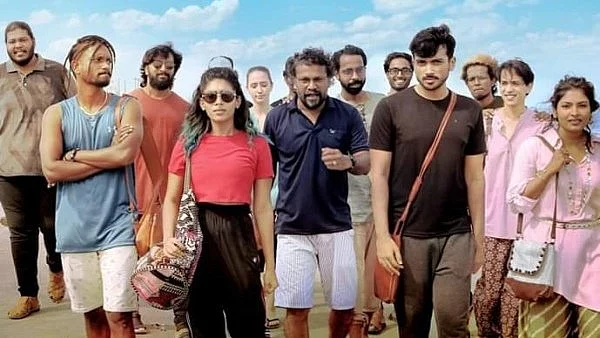In August 2012, Pa Ranjith’s debut directorial Attakathi was released. Exactly a decade later, he came up with Natchathiram Nagargiradhu as the perfect gift for his fans to celebrate his ten-year anniversary in the film industry
What is love? Why do people fall in love? Is there a hidden agenda behind this emotion? Should the expression of love only be physical? If yes, then is it really love or lust? Is marriage the true expression of love? Who are we allowed to fall in love with? Is casteless, ageless and genderless love a myth?
Natchathiram Nagargiradhu answers these and more with a strong statement - ‘Love is not romantic, it is political’.
What starts off as a cute fight between Renne (Dushara Vijayan) and Iniyan (Kalidas Jayaram) over their choice of music soon escalates into a casteist slur, resulting in their breakup. They are part of a theatre group and play the leads in a show about love.
Natchathiram Nagargiradhu is full of characters from the LGBTQIA community. For a story centered around thespians, the film is devoid of drama or fluff. It is a celebration of love, life and hope.
The film revolves around honour killings and also delves into prejudices and crimes based on class, gender, sexuality, religion and one’s lifestyle choices. It reiterates how insignificant human beings are in this universe and how amusing it is that we are always finding ways to discriminate against each other.
From the imagery to powerful dialogues and the screenplay, Pa Ranjith's movie scores on all aspects.
There should be a special mention about Renne’s monologue, wherein she elaborates on how her caste has chased her right from her birth and how she reverses her trauma to empower herself. Then there's also the conversations with victims of violence, who are deified as 'Kaaval Deivangal'.
There is a brilliant scene which reminds us of Arivu’s ‘Enjoy Enjaami’. It shows how, on one hand, a tea plantation can be seen as scenic and beautiful to the privileged and how on the other it's a symbol of generational oppression for the Dalits.
Interspersed with flashes of honour killings is Oppari, the music of lament. Natchathiram Nagargiradhu recounts the horrors of the oppressed community and gives a fitting reply to those who claim that Dalits engage in 'Naadaga Kaadhal' (loosely translated as fake love, a conspiracy by the upper caste to attack and humiliate them).
The best part of the film is that it doesn’t cancel you if you are in the wrong. Rather, it offers you a chance to reflect on your thoughts and actions.
Kalaiyarasan’s character arc is Pa Ranjith's way of saying that no one is born as a politically-correct person. The filmmaker intentionally makes Arjun (Kalai), a misogynist, casteist, homophobic and transphobic person, utter offensive remarks and pass them off as jokes. But the film is sensitive enough to make those who laugh at this kind of objectionable humour feel ashamed. Through Arjun's transformation, we also learn.
From moral policing, food politics to polarised beliefs, the film engages in a dignified debate.
We have seen how, with Dhammam, Pa Ranjith can inject humour while dealing with a subject like oppression without trivializing its seriousness. Natchathiram Nagargiradhu has a similar treatment.
Truth can either disturb you or comfort you. Natchathiram Nagargiradhu hurls the truth so fiercely that, depending on your response to that stimuli, it can feel like a chaotic tsunami or a gentle breeze.
The film is now running in theatres.
(At The Quint, we question everything. Play an active role in shaping our journalism by becoming a member today.)
